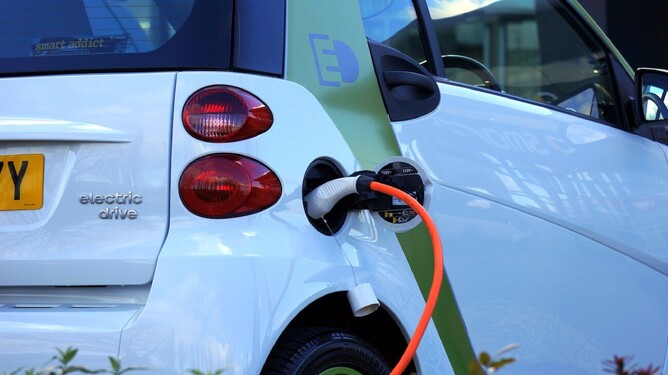Electric cars are becoming increasingly popular, with soaring fuel prices and the growing availability of charging stations - but they may also be advantageous from a cost perspective, particularly for businesses.
Hybrids and fully electric vehicles tend to be slightly more expensive than conventional fuel-powered cars, but favourable tax treatments may offset that expense.
Along with purchase incentives for private buyers (available on new electric cars), organisations that offer their staff company cars can claim allowances and grants, which we'll run through below.
Benefits In-Kind on Electric Company Cars
Any employer who provides an employee with a car they can use privately must declare the benefit in kind through a P11D submission.
Benefits are calculated as a percentage of the list price with a lower rate applied, the more eco-friendly the vehicle.
Fuel-heavy petrol or diesel cars can attract a benefit in kind up to 37% of the official list price.
In contrast, an electric vehicle attracts a 2% taxable benefit from April 2022 until March 2025.
The saving is significant because benefits in kind are subject to both Income Tax and National Insurance:
- Employees can benefit from a tax saving of 45% or more, and the business avoids paying Class 1A NIC contributions.
- If the company car is charged at the office, there is no fuel benefit.
- Charging stations fitted at the employee's residence but paid for by the business will not attract any taxable benefit.
Capital Allowances on Electric Company Vehicles
The government offers capital allowances up to 100% in year one, meaning a business can offset the cost of switching to electric vehicles provided they buy either zero-emission or fully electric cars.
Below we've summarised the allowances claimable, depending on the type of company car you buy:
- New car with zero CO2 emissions - First-year allowances (100%)
- New vehicle with CO2 emissions of 50g/km or less - Main rate allowances (18%)
- Second-hand car with emissions of 50g/km or less - Main rate allowances (18%)
- New or second-hand car with CO2 emissions over 50g/km - Special rate allowances (6%)
Note that the Super Deduction does not apply - this 130% first-year capital allowance is only available against assets such as machinery, computers and tools.
Cars sit outside of mail pool assets, but charging stations are eligible.
If a business spends £10,000 fitting electric vehicle charging points, they can claim the 130% allowance and reduce their profits subject to Corporation Tax by £13,000.
VAT Claims on Electric Vehicle Purchases
Companies can reclaim the VAT element of the vehicle purchase price with a couple of caveats:
- If they cannot prove that the car is for 100% business use, the VAT reclaimed is limited to 50%.
- Likewise, the business can claim 50% of the VAT cost if the employee can use the car for personal reasons.
Only low-emission or electric cars with under 50g/kg of CO2 emissions are allowed to reclaim the full cost of the VAT - other vehicles qualify for a maximum of 85% VAT relief.
Plug-In Grants for Low-Emission Vehicles
Another way to reduce the cost of changing to electric company vehicles is to look for dealerships or manufacturers enrolled in the government's Plug-In Grant scheme.
There isn't a financial grant you apply for - rather, the dealer claims the grant and reduces the vehicle price accordingly.
Grants vary depending on the vehicle category but are available for vans, trucks, taxis and accessible vehicles.
If you are considering investing in business vehicles (rather than company cars for employee use), you could receive a discount as below.
- Small van: 35% grant up to £2,500
- Large van: 35% grant up to £5,000
- Small truck: 20% grant up to £16,000
- Large truck: 20% grant up to £25,000
- Taxi: 20% grant up to £7,500
- Accessible vehicle: 35% grant up to £2,500
Businesses can use the grant scheme to purchase up to 1,000 company vehicles, although there are caps on some of the grants, which have an application threshold that resets each tax year.
Qualifying vehicles need to be specific models - you can find all the details HERE.
EV Chargepoint Grants for Businesses
Along with the Super Deduction allowance, a company can claim a grant towards the cost of installing an electrical charge point at their place of business.
Eligible companies must:
- Be registered at Companies House or HMRC.
- Have no more than 249 employees.
- Not have received over £200,000 of public funding in the last three years.
EV Chargepoint Grants offer up to £15,000 per application (75% of the cost) and can cover up to five installations by the same business, provided the charge points are at different premises.
The grant provides up to £500 for each parking space and £350 for each socket installed.
Is It Worth Changing to Electric Company Cars?
With the sale of new diesel or petrol cars set to be banned from 2030 onward, it makes sense to investigate the pros and cons of fuel vs electric if you are planning to buy any company vehicle - whether a staff car or a commercial van.
There are several incentive schemes and allowances, and the best option may depend on whether you intend to buy, lease or rent your new vehicle.
We are always happy to have a chat about the grants and tax deductions available that might make an electric company car a financially lucrative option.
Please get in touch with SAS Accounting at your convenience if you would like more information about any of the topics discussed!


